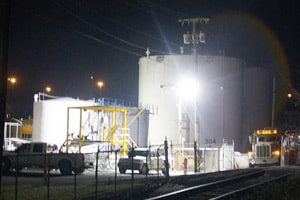
A West Virginia river is the site of a chemical spill that has led to a state of emergency; been deemed a federal disaster; and left some 300,000 people and businesses, including hospitals, schools, and nursing homes, under a water ban. West Virginia Governor Earl Ray Tomblin declared a state of emergency for nine counties […]
 A West Virginia river is the site of a chemical spill that has led to a state of emergency; been deemed a federal disaster; and left some 300,000 people and businesses, including hospitals, schools, and nursing homes, under a water ban.
A West Virginia river is the site of a chemical spill that has led to a state of emergency; been deemed a federal disaster; and left some 300,000 people and businesses, including hospitals, schools, and nursing homes, under a water ban.
West Virginia Governor Earl Ray Tomblin declared a state of emergency for nine counties following a spill into the Elk River following a 4-Methylcyclohexane Methanol spill. The compound is a coal processing chemical and sudsing agent, according to a Reuters report. Authorities are working to determine the concentration and quantity of the chemical spilled.
The declaration of a federal disaster was issued early this morning, according to FoxNews. Being designated a federal disaster means that direct federal assistance is available, said Bill Hines of the Federal Emergency Management Agency (FEMA).
The governor announced that, “West Virginians in the affected service areas are urged not to use tap water for drinking, cooking, washing or bathing…. Right now, our priorities are our hospitals, nursing homes and schools,” according to Reuters. In all, nine counties are under the ban and several public service districts have also been advised against using their water, The West Virginia Gazette reported.
The West Virginia Department of Environment Protection (DEP) indicated that it was advised of a strange odor, which was traced to the Freedom Industries site and a storage unit there, said governor spokeswoman, Amy Shuler Goodwin. Water testing is taking place by West Virginia Water and state environmental officials, wrote Reuters.
Governor Tomblin said, “Nobody really knows how dangerous it could be. However, it is in the system. It’s just so important, according to the health department, as well as West Virginia American: Please don’t drink, don’t wash with, don’t do anything with the water,” The West Virginia Gazette reported.
The state of emergency is expected to be in effect until the state Department of Health and Human Resources, the Department of Environmental Protection, and West Virginia American Water all clear the water, the governor said, according to The West Virginia Gazette. “It could take some time, they can’t tell us how long it will take, to get the system flushed clean because some of these pipes go out as far as 60 miles.”
According to a number of studies, including peer-reviewed research, the National Institutes of Health (NIH) indicates that even short-term exposure to methylcyclohexanol can cause reactions when the chemical is breathed in or absorbed through the skin. Reactions include eye and skin, and upper respiratory tract irritation. Longer or excessive exposure can cause headaches; irritation of the ocular (eye), respiratory, and other mucous membranes; damage to the heart, liver, kidney, and lung; and death. At least one peer-reviewed study found that exposure to methylcyclohexanol caused a drop in blood leukocytes; one person was diagnosed with lymphocytosis.
Mike Dorsey, director of emergency response and homeland security for the state Department of Environmental Protection (DEP), reported that his division learned of the spill from DEP air-quality officials who received reports of an odor and discovered the spill, according to The West Virginia Gazette. State investigators found that the leak originated at the bottom of a storage tank, overwhelming a secondary containment concrete dike, said Dorsey. “That was going over the hill into the river,” Dorsey said. “Apparently, it had been leaking for some time. We just don’t know how long.”
“This is not a chemical that we deal with every day. It’s not the type of thing we would see in dealing with a water treatment plant,” McIntyre noted. “Extensive flushing” is required, The West Virginia Gazette reported.
Freedom Industries did not self-report the spill to any regulatory agency.


